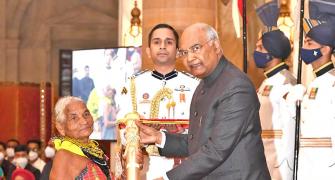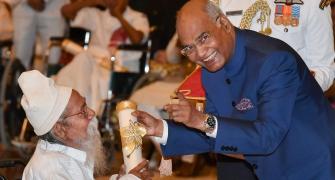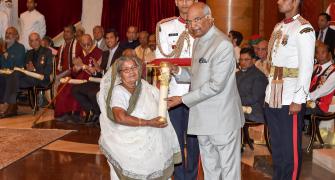No longer, points out Virendra Kapoor, are these awards given on the recommendation of ministers or the Delhi-based liaison men who had ruled the roast till 2014.

'This government has made a long overdue shift in the texture of the Padma Award recipients. Now, the focus is largely on individuals making seminal contributions to the improvement of society at grassroots level. I truly felt undeserving of being among their ranks.'
This is what Anand Mahindra, the head of the Mahindra and Mahindra industrial group, tweeted after he was honoured with the Padma Vibhushan award for contribution in the field of trade and industry.
Regardless of his status as one of the country's top industrialists who is known not to bend rules to get ahead, rare among moneybags, Mahindra could be commended both for his humility and his acknowledgement of the positive change in the selection of annual civilian awardees.
Not in a longtime had the Padma awards recognised the genuine grassroots change-makers in the society.
That is, until the Modi government made a conscious decision to switch away from the New Delhi lobby-based grant of the highest civilian awards to a nation-wide participative selection process.
No longer are these awards given on the recommendation of ministers, or the Delhi-based liaison men who had ruled the roast till 2014.
Since 2017 the selection process has been so democratised that ordinary men and women recommend the names of persons who they feel deserve recognition for their selfless service, for making a difference to their lives.
Consider a few awardees this year.
Social media is agog with the heartening photograph of a bare-footed and bare-backed Tulsi Gowda walking up to the podium to receive her Padma Bhushan from President Ram Nath Kovind.
In particular, the following comment overwritten on the photo depicting her walking past Modi and Amit Shah underlines the transformation wrought by the change of focus in the grant of annual civilian awards.
It reads: 'Such is her achievement that though without chappals and barely able to cover herself, she has two of the country's most powerful men bowing down to her in great humility.'
The 75-year-old Gowda from Karnataka has found national recognition for having planted over 30,000 saplings.
Her first-hand knowledge of forestry and environment and a lifelong effort to conserve nature was earlier known to people active in the field in her State.
But, hopefully, the national recognition will inspire others to preserve nature and to fight against global warming.
Then there is Karekala Hajabba. The 69-year-old orange vendor, also from Karnataka, took it to heart when he failed to understand a foreigner who asked him the price of oranges.
He vowed to set up a school in his village from his meager savings for the poor children.
Now that school has expanded to teach up to 10th class.
Or take another Padma awardee this year. The 83-year-old Mohammed Sharif from Ayodhya in UP.
Over the years he has performed the last rites of about 25,000 unclaimed bodies in his region.
Of course, who can forget the picture of Manjamma Jogati, a transgender folk dancer, who before receiving her Padma Shri sought to bless President Ram Nath Kovind, putting her hand over his head.
The grant of a Padma award in the art and culture category to Jogati is also significant given that the ruling party is known to be socially conservative.
Indeed, social media has a contrasting photograph of the British queen conferring the knighthood on persons who are mandatorily required to kneel before her and the Padma awardee Manjamma Jogati obliging the head of the Indian Republic to lower his head so that she could shower blessings on him.
To gauze the real transformation in the choice of Padma awardees one has to scan the list of winners only a few years ago.
Delhi-centric individuals with access to the seat of power invariably dominated these awards.
Knowing the personal assistant of the prime minister or minister was usually enough for one to figure in the honours list traditionally announced each Republic Day.
Indeed, the institution of highest civilian awards was so thoroughly abused that very often these were sold to the highest bidder by those close to the seat of power in the national capital.

This led a number of well-meaning commentators to demand the abolition of these awards.
It was argued that in a democracy there was no justification for creating a separate category of citizens by conferring on them these honours, especially without any transparent selection process.
In fact, in the Constituent Assembly itself some members had pointed out the incongruity of the Padma awards in a democratic Republic but they were told that these awards would bestow commendation on the most deserving people in various walks of life and, thus, serve as inspiration to ordinary people.
However, over the years highest civilian awards came to be given for the lowest of motives insofar as those close to the ruling establishment flaunted them.
Not many people are aware that winners of these awards are not supposed to prefix their names with the Padma awards but everyone without exception flouts the unwritten convention.
Meanwhile, another provision in the Constitution which has been over the years abused thoroughly by all governments concerns the nomination of twelve members to the Rajya Sabha.
Not unlike the degradation of the Padma Awards, which the Modi government has now sought to check, the nominations to the Rajya Sabha too need to adhere to the original objectives enlisted by the Founding Fathers.
Men and women of excellence in various fields of human endeavour, including science and technology, sports, culture and arts, etc, to mention only a few, ought to be nominated to the Upper House.
Unfortunately, over the years the provision has been grossly abused to accommodate members of the ruling party or its sympathisers.
It is a different matter that when eminent men and women were nominated they made little contribution to enrich the parliamentary proceedings with their expertise and knowledge.
For instance, neither Sachin Tendulkar nor Lata Mangeshkar rarely, if at all, cared to attend the Rajya Sabha.
Since the Rajya Sabha nominations are used to accommodate supporters of the ruling regime, these either need to revert to the original intent of the Founding Fathers or need to be abolished outright.
Feature Presentation: Aslam Hunani/Rediff.com









